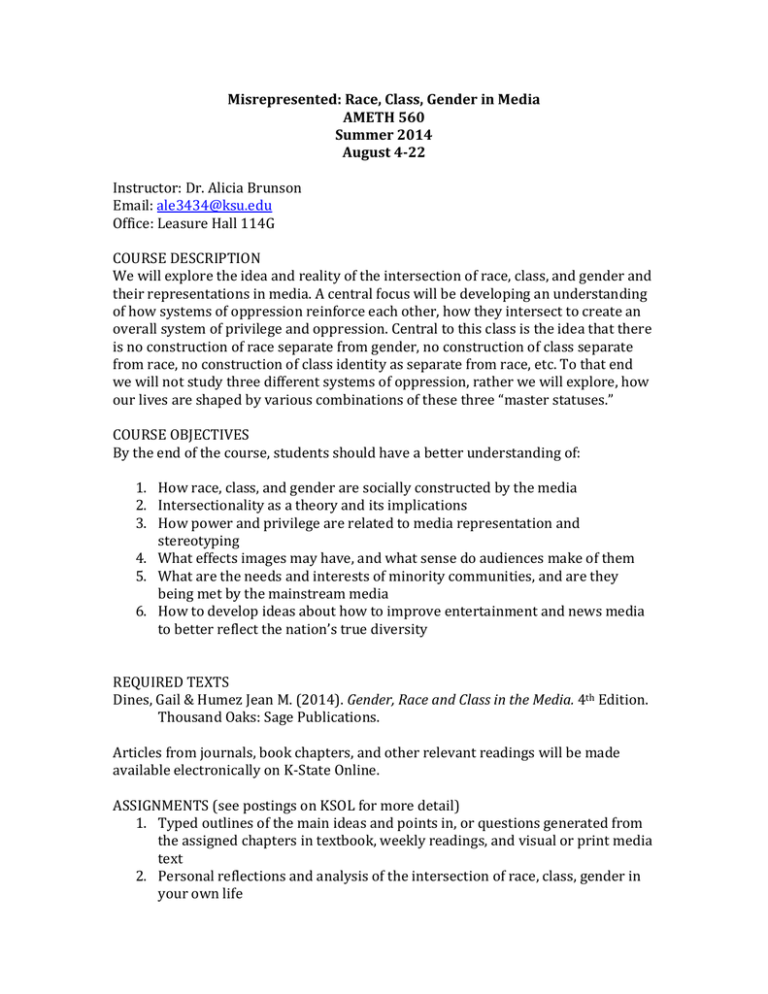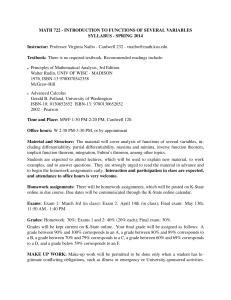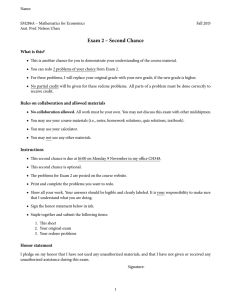Misrepresented: Race, Class, Gender in Media AMETH 560 Summer 2014 August 4-22
advertisement

Misrepresented: Race, Class, Gender in Media AMETH 560 Summer 2014 August 4-22 Instructor: Dr. Alicia Brunson Email: ale3434@ksu.edu Office: Leasure Hall 114G COURSE DESCRIPTION We will explore the idea and reality of the intersection of race, class, and gender and their representations in media. A central focus will be developing an understanding of how systems of oppression reinforce each other, how they intersect to create an overall system of privilege and oppression. Central to this class is the idea that there is no construction of race separate from gender, no construction of class separate from race, no construction of class identity as separate from race, etc. To that end we will not study three different systems of oppression, rather we will explore, how our lives are shaped by various combinations of these three “master statuses.” COURSE OBJECTIVES By the end of the course, students should have a better understanding of: 1. How race, class, and gender are socially constructed by the media 2. Intersectionality as a theory and its implications 3. How power and privilege are related to media representation and stereotyping 4. What effects images may have, and what sense do audiences make of them 5. What are the needs and interests of minority communities, and are they being met by the mainstream media 6. How to develop ideas about how to improve entertainment and news media to better reflect the nation’s true diversity REQUIRED TEXTS Dines, Gail & Humez Jean M. (2014). Gender, Race and Class in the Media. 4th Edition. Thousand Oaks: Sage Publications. Articles from journals, book chapters, and other relevant readings will be made available electronically on K-State Online. ASSIGNMENTS (see postings on KSOL for more detail) 1. Typed outlines of the main ideas and points in, or questions generated from the assigned chapters in textbook, weekly readings, and visual or print media text 2. Personal reflections and analysis of the intersection of race, class, gender in your own life 3. Media analysis of the intersection of two identities using a dominant, negotiated, or oppositional reading 4. Participation and contribution to online discussions MODULES 1. Introduction to the course a. What is intersectionality b. Matrix of domination c. What are media 2. Social construction a. Race b. Class c. Gender d. Representation in television 3. Ideologies a. Representation in film 4. Social change and agency a. Media literacy b. Representation in advertising 5. Summing up a. Reflections GRADING Typed Outlines (3 total) Personal Reflection Papers (2 total) Media Analysis (3 total) Discussions Total 75 points 50 points 150 points 75 points 350 points Your final grade will be calculated on a straight scale using the following percentages: 90-100% = A 80-89% = B 70-79& = C 60-69% = D 59% and bellow = F GUILDLINES FOR WRITTEN ASSIGNMENTS All written assignments must use “normal” font using, with one inch margins all the way around. Papers must be written using APA format. The papers must be doublespaced with no extra spacing between paragraphs. Any directly quoted sections that are more than three typed lines must have a 1 ½ margin on left and right and be single spaced. Organize your thoughts into a coherent form. Make it obvious to the reader of your essay where you are going in your paper and how you propose to get there. I expect quotes and less formal references to the readings to demonstrate your argument or theme. CLASS EXPECTATIONS In this course, we will engage with the ideas and issues of race, class, and gender in the media through discussions, readings, and writings. Your active participation in the learning process is expected and valued. Race, class, and gender in the media is a stimulating topic area, filled with controversies that touch upon our personal values, beliefs, and issues of identity. I encourage you to share your thoughts, concerns, and opinions. We will have a stimulating learning environment and a richer learning experience if we can discuss a wide range of perspectives. At the same time, the issues we will address can be highly emotional ones and we won’t always agree with one another. It is absolutely vital that everyone feels safe to air her or his ideas and opinions. Please be sensitive and respectful to other viewpoints when making comments and contributing to discussion. All written assignments are to be turned in by the due date in their appropriate drop boxes on KSOL. I do not accept late assignments. If you have extenuating circumstances, please inform me early on (i.e. a few days before the assignment is due, not the day before or day when the assignment is due). QUESTIONS AND ANSWERS FORUM Please use this forum to post questions about the course material, assignments, the learning management system, or online homework. I will monitor this forum, but you should also feel free to post answers to help other students. This helps to create a general FAQ so that students in the course may benefit from the exchange. TECHNICAL SUPPORT If you are having technical difficulties please contact Kansas State IT support. GRADE DISPUTE Any question or dispute over the earned points on any assignment should addressed in writing to the course instructor, who will follow the grade dispute policy of the University. REQUIRED UNIVERSITY POLICIES 1. Statement Regarding Academic Honesty Kansas State University has an Honor System based on personal integrity, which is presumed to be sufficient assurance that, in academic matters, one's work is performed honestly and without unauthorized assistance. Undergraduate and graduate students, by registration, acknowledge the jurisdiction of the Honor System. The policies and procedures of the Honor System apply to all full and part-time students enrolled in undergraduate and graduate courses on-campus, off-campus, and via distance learning. The honor system website can be reached via the following URL: www.kstate.edu/honor . A component vital to the Honor System is the inclusion of the Honor Pledge, which applies to all assignments, examinations, or other course work undertaken by students. The Honor Pledge is implied, whether or not it is stated: "On my honor, as a student, I have neither given nor received unauthorized aid on this academic work." A grade of XF can result from a breach of academic honesty. The F indicates failure in the course; the X indicates the reason is an Honor Pledge violation. ACADEMIC DISHONESTY refers to forms of cheating and plagiarism (see Plagiarism Workshop) which results in students giving or receiving unauthorized assistance in an academic exercise or receiving credit for work which is not their own (Pavela, 1978). Forms of Academic Dishonesty Cheating intentionally using or attempting to use unauthorized materials, information, or study aids in any academic exercise. The term academic exercise includes all forms of work submitted for credit or hours. Plagiarism the deliberate adoption or reproduction of ideas, words or statements of another person as one's own without acknowledgement. Fabrication intentional and unauthorized falsification or invention of any information or citation in an academic exercise. Facilitating academic dishonesty intentionally or knowingly helping or attempting to help another to violate a provision of the institutional code of academic integrity. If caught cheating, you receive no credit for the assignment or test. If caught making a more egregious act of cheating, you will fail the class and receive an “XF” and be reported to the university AVOIDING PLAGERISM The OWL at Purdue http://owl.english.purdue.edu/owl/resource/589/01/ This page provides helpful tips to avoid plagiarism and how to use citations. 2. Statement Regarding Students with Disabilities "Any student with a disability who needs a classroom accommodation, access to technology, assistance during an emergency evacuation, or other assistance in this course should contact Disability Support Services and/or the instructor. DSS serves students with a wide range of disabilities including, but not limited to, physical disabilities, sensory impairments, learning disabilities, attention deficit disorder, depression, and anxiety ." For a student enrolled in courses on the Manhattan or Olathe campus, contact dss@k-state.edu; on Salina campus, contact Danielle Brown, dnbrown@k-state.edu; and for online courses, Andrea Blair, andreab@k-state.edu. * Faculty members who have a student with a disability in their class will want to contact Disability Support Services. DSS will help faculty provide academic accommodations for students with documented disabilities. Accommodations may include administration of course exams with extended time and/or distraction reduced environment, notetaking services, or providing alternate format of text materials. For courses taught on the Manhattan campus or online contact Andrea Blair, andreab@k-state.edu, 785.532.6441; Salina campus, Danielle Brown, dnbrown@k-state.edu, 785.826.2649; and Olathe campus: Dana Reinert, dmr4159@k-state.edu, 913-307-7340. 3. Statement Defining Expectations for Classroom Conduct All student activities in the University, including this course, are governed by the Student Judicial Conduct Code as outlined in the Student Governing Association By Laws, Article VI, Section 3, number 2. Students who engage in behavior that disrupts the learning environment may be asked to leave the class.

